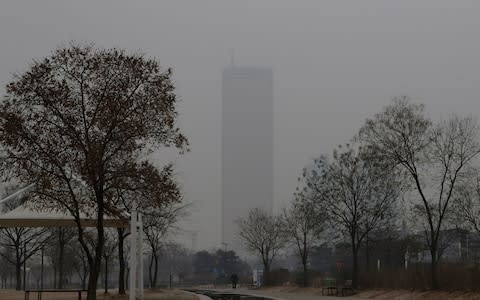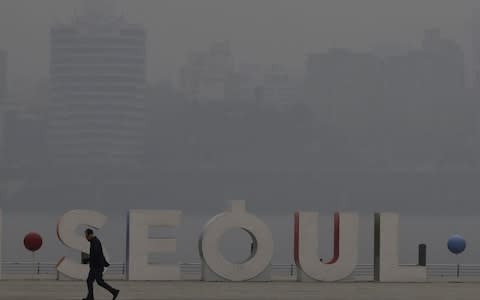Seoul implements emergency measures to combat record pollution levels as Thailand deploys rainmaking planes

South Korea has introduced emergency measures in an effort to combat potentially lethal levels of ultra-fine particulate pollution across a large part of the country.
Levels of dust pollution in the air reached a record high on Monday, with the amount of ultra-fine particles reaching 194 microgrammes per cubic metre in Seoul, the highest since records were first collated in 2015. Yonhap news reported.
The government has ordered operators of thermal power plants to reduce their output to 80 per cent of normal operations and diesel vehicles weighing more than 2.27 tonnes have been banned from the roads of the capital.
Half of the nation’s civil servants have been prohibited from driving to work and must instead use public transport, while around 100 public buildings have been told to reduce working hours.
Pollution levels were forecast to remain high during Tuesday - a record third day that emergency measures have been in place - but should begin to dissipate later in the day as cold winds pick up, according to the National Institute of Environmental Research.
Under government-set standards, 75 microgrammes of ultra-fine dust per cubic metre is classified as “very bad”, while the World Health Organisation specifies 25 microgrammes as the recommended maximum.

The haze that blankets many Korean cities in the winter months is the result of emissions from vehicles, thermal power plants and industrial facilities, while inhaling air with elevated levels of particulate pollution can cause a number of respiratory diseases, asthma and lung cancer. It has also been linked to birth defects and premature deaths.
The government has also issued emergency text alerts to warn the public about the elevated levels of pollution, calling on pedestrians to wear face masks and to avoid outdoor activities. The skating rink in front of Seoul’s City Hall has also been closed down.
South Korea insists that as much as 60 percent of the pollution drifts across the Yellow Sea from China, although Beijing disputes that claim. In a visit to Seoul in December, a Chinese government official stated that the smog is being generated in Korea and is not a result of industrial developments in China.
Politicians and the public have taken issue with that suggestion and a number of petitions on the government’s web site have demanded that the authorities take drastic measures to reduce pollution, including demanding that China act to reduce its emissions.

Thailand has also been fighting dangerous levels of pollution this winter. Authorities in the Thai capital, Bangkok, on Monday fired water cannons, hosed down the streets and handed out masks to help citizens cope with the unhealthy air.
Amid growing public discontent about poor air quality, the city is also set to deploy rainmaking planes to seed clouds in an effort to disperse hazardous levels of PM 2.5 dust particles which have shrouded Bangkok, normally a thriving tourist metropolis during the hot, dry winter season.
The seeding technique involves dispersing chemicals into the air to aid cloud condensation and prompt rainfall to help clear the pollution.
PM 2.5 particles had exceeded the safe level in 30 of 50 Bangkok's districts for days, Bangkok governor Aswin Kwanmuang told reporters.
According to the popular website airvisual.com, which measures pollution levels in cities worldwide, Bangkok on Monday ranked among the top ten for dirtiest air. Visibility in some areas was reduced to just one kilometre.
Diesel fumes from cars contribute to 50-60% of the PM 2.5 pollution while the burning of rubbish and crops accounts for about 35%, said the department of pollution control.
The Bangkok Post reported that short term measures to curb the problem may include restrictions on large vehicles entering the city centre, police checkpoints to monitor emissions from busses and old cars, the deployment of two BT-67 planes to spray water over the city.

 Yahoo News
Yahoo News 